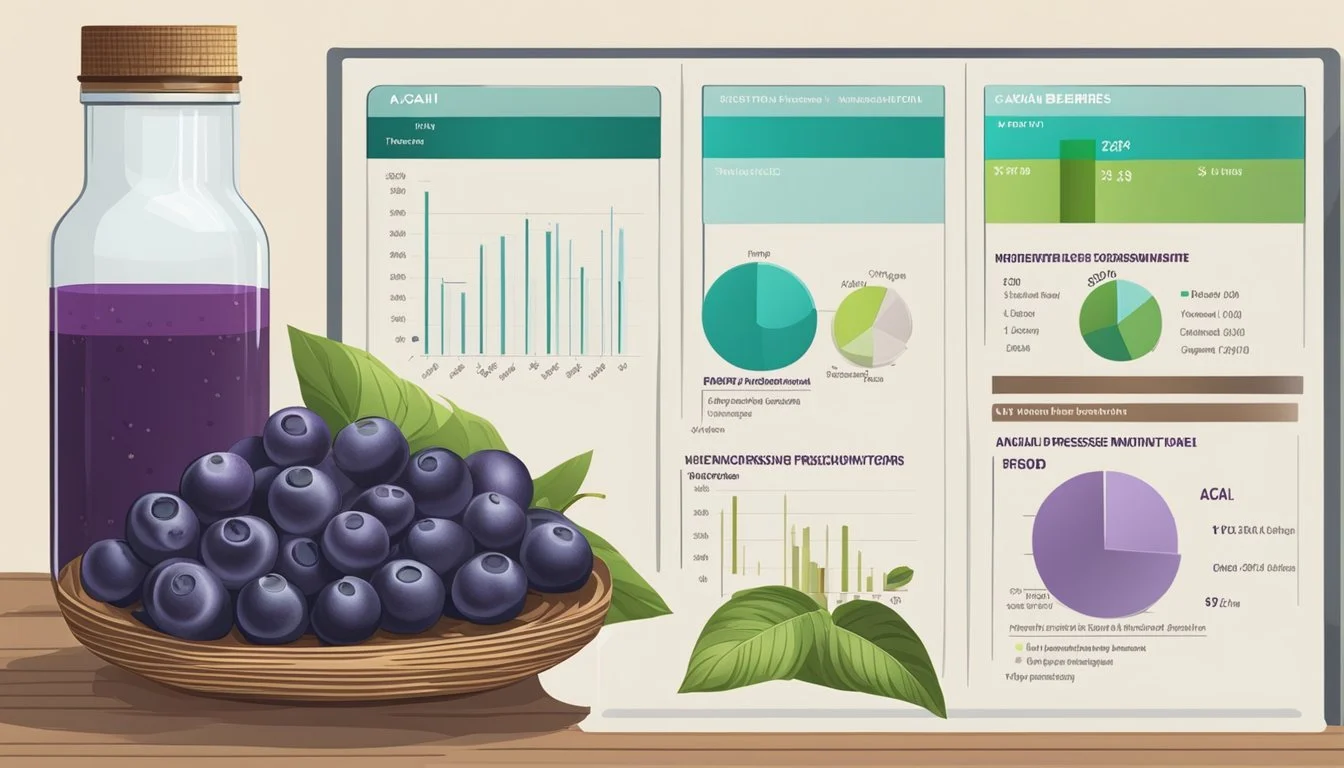Can Consuming Acai Berries Help Lower Blood Pressure?
Unwrapping the Evidence
Acai berries have gained popularity not only as a superfood for their rich antioxidant properties but also for their potential health benefits, including a possible effect on blood pressure regulation. Originating from the Amazon rainforest, these dark purple fruits (What wine goes well with fruits?) contain plant sterols and a high fiber content, components that are believed to have a positive impact on cardiovascular health. They might contribute to lowering blood pressure, an important factor in reducing the risk of heart disease and related conditions.
While there is no one-size-fits-all answer concerning diet and hypertension, integrating acai berries into a balanced diet could be one piece of the puzzle for those managing their blood pressure. Observations suggest that the phytochemicals in acai berries may help relax blood vessels which in turn can reduce blood pressure. However, such suggestions are based on the broader health impacts of phytochemical-rich foods rather than on acai-specific clinical trials.
Evidence points to dietary choices playing a crucial role in controlling hypertension. In this context, acai berries may offer a nutritional option to contribute to a heart-healthy diet. Nonetheless, it's vital to view them as part of an overall lifestyle approach, including regular exercise, stress management, and other dietary modifications, rather than as a standalone solution for blood pressure concerns. As with any food, moderation and variety are key, and it’s advisable for those considering acai berries for health reasons to consult with healthcare professionals.
Nutritional Profile of Acai Berries
Acai berries are nutritionally dense and particularly noted for their high antioxidant content. Understanding the specific vitamins, minerals, fiber, and fats they contain can offer insights into their potential health benefits.
Vitamins and Minerals in Acai
Acai berries are a rich source of several vitamins and minerals that play essential roles in the body. They contain Vitamin A, which is important for immune function, vision, and skin health. Vitamin C within acai berries contributes to immune defense and skin health as well. Minerals in acai berries include:
Calcium: vital for bone health and muscular function.
Potassium: necessary for blood pressure regulation and proper heart function.
Iron: essential for the transportation of oxygen in the blood.
Magnesium: involved in over 300 biochemical reactions in the body.
Fiber and Healthy Fats
The fibers found in acai berries contribute to a healthy digestive system and may help in maintaining a healthy weight. Acai is also composed of healthy fats, like omega-3, omega-6, and omega-9 fatty acids, which support heart health and cognitive function. The content of these nutrients can vary, but typically acai berries offer a balance between dietary fiber and beneficial fats.
Nutrient Benefit Fiber Aids in digestion and may help control blood sugar levels Healthy Fats Essential for brain health and reducing inflammation
Potential Health Benefits of Acai Berries
Acai berries are celebrated for their high concentrations of antioxidants and potential health benefits, particularly relating to heart health and anti-inflammatory effects.
Heart Health
Acai berries are associated with heart health due to their antioxidant content, particularly anthocyanins, which may help to lower cholesterol levels. The antioxidants found in acai berries are believed to help protect against atherosclerosis, a condition that can lead to heart disease.
Cholesterol Reduction: Regular consumption may result in decreased LDL (bad cholesterol) levels while maintaining HDL (good cholesterol).
Blood Pressure: Antioxidants may aid in blood pressure regulation, contributing to overall cardiovascular health.
Anti-Inflammatory Properties
The compounds present in acai berries have an anti-inflammatory effect that may contribute to the modulation of inflammatory processes.
Reduction of Inflammatory Markers: Consumption of antioxidants can lead to lowered levels of inflammation markers in the body, potentially alleviating symptoms associated with chronic inflammatory diseases.
Weight Management
Though direct evidence is limited, there is a suggestion that acai berries may aid in weight loss and weight management through several mechanisms:
Metabolism: Antioxidants might impact metabolism, indirectly influencing weight management.
Blood Sugar Levels: Through their potential effects on metabolism, acai berries could help maintain stable blood sugar levels, which is an important factor in weight control.
Cancer Prevention
While no food alone can prevent cancer, antioxidant-rich foods like acai berries might have a role in a cancer-preventative diet.
Antioxidant Activity: The high levels of antioxidants in these berries, such as anthocyanins and vitamin C, are suggested to reduce the risk of cancer by neutralizing harmful free radicals.
Cellular Health: By defending against oxidative damage, acai berries may contribute to the overall health of cells, possibly reducing the incidence of certain types of cancer.
Impact of Acai Berries on Blood Pressure
The consumption of acai berries may influence blood pressure through various physiological pathways. These small, dark purple fruits are recognized for their antioxidant properties, primarily due to compounds such as anthocyanins. Antioxidants play a crucial role in mitigating oxidative stress caused by free radicals, which can damage cells and lead to inflammation—a contributing factor to high blood pressure.
Research Findings:
A diet rich in antioxidants from fruits and vegetables is associated with better blood pressure regulation.
Regular intake of these antioxidants may assist in the reduction of inflammation, which is beneficial for individuals with hypertension.
Cholesterol and Blood Pressure: Acai berries contain components that have been linked to cholesterol level management. Balanced cholesterol levels are important because they help maintain arterial health, reducing the risk of hypertension.
Dietary Impact:
Fiber: Acai berries are a source of dietary fiber, which supports cardiovascular health and can have a positive effect on blood pressure.
Healthy Fats: They possess healthy fats, known to aid in maintaining a balance in blood pressure levels.
In summary, while acai berries hold nutritional value that may favorably impact blood pressure, they should not be viewed as a standalone solution. They work best as a component of a balanced diet that supports cardiovascular health. Consumers should be aware of the need for more comprehensive clinical evidence specifically linking acai berry consumption to blood pressure management before making definitive health decisions.
Acai Berries in Diet and Supplementation
Incorporating acai berries into one's diet and choosing supplementation can offer a flavorful way to potentially support health goals. The following segments outline the various forms in which acai can be consumed.
Acai in Solid Forms
Acai berries can be enjoyed in their whole fruit form, though they are often found freeze-dried or in acai bowls. Bowls commonly blend acai puree with other fruits and may include toppings like granola and banana slices. Solid forms of acai retain most of the fruit's natural nutrients and are more filling due to their fiber content.
Caloric Content: Fresh acai berries or freeze-dried preparations provide essential nutrients with relatively low calories.
Acai Juices and Smoothies
Juice made from acai is another option, available in bottled form or as part of a smoothie. When acai puree is mixed with other juices or blended with ingredients like banana and berries, it results in a nutrient-rich drink. Care should be taken, as some products may add extra sugar, increasing the caloric intake.
Servings: Aim for 100% pure acai juice to avoid added sugars.
Smoothies: Combine acai with other low-calorie fruits and vegetables for a nutritious snack.
Supplements and Powders
Dietary supplements and powders containing acai berry extract provide a convenient way to obtain the antioxidant benefits of acai without the need to prepare the fruit. These products should be taken according to the dosage instructions on the package.
Supplement Facts:
Typical Dosage: Varies by product (check label)
Form: Capsules, tablets, or loose powder for mixing
Powders:
Easily added to beverages or bowls
Check for pure acai without unnecessary fillers
Comparison With Other Berries
In assessing the impact of açaí berries on blood pressure regulation, it is essential to evaluate their nutritional profile and antioxidant capacity relative to other commonly consumed berries.
Nutritional Varieties
Different berries boast diverse nutritional offerings, particularly concerning their vitamin and mineral compositions. For instance, strawberries are rich in vitamin C, with a single cup providing more than the daily requirement, while blueberries are commended for their fiber content. Cranberries are another source of vitamin C and fiber, though they are more commonly consumed as juice which may reduce their fiber content. Raspberries are high in fiber and vitamin C as well, and blackberries compete with açaí in terms of fiber provision.
Açaí berries distinguish themselves with notable levels of heart-healthy fats, which are uncommon in other berries. Although not typically analyzed for their direct impact on blood pressure, these nutritional nuances could contribute to overall cardiovascular health.
Berry Type Notable Nutrient Amount per Cup Strawberries Vitamin C 85mg Blueberries Fiber 4g Blackberries Antioxidants High Raspberries Fiber, Vitamin C 8g, 54% DV Cranberries Vitamin C, Fiber - Açaí Berries Heart-healthy fats -
Antioxidant Levels
Antioxidants are crucial for countering oxidative stress, a factor known to affect blood pressure. Açaí berries stand out with potent antioxidant properties, primarily due to high levels of anthocyanins, which are compounds contributing to their deep purple color. The antioxidative capacity of açaí may exceed that of more common fruits by a significant margin, potentially offering superior protection against hypertension-linked oxidative stress.
Blueberries follow closely, celebrated for their high antioxidant content, including anthocyanins and other phytochemicals that support vascular health. Blackberries and raspberries also contain these beneficial antioxidants, though in varying quantities.
In a direct comparison, açaí berries may have more antioxidants than strawberries and cranberries, which are still good sources but might not reach the antioxidative prowess of açaí and other darker berries.
Berry Type Antioxidant Property Comparison Açaí Berries Anthocyanins (high levels) Highest among berries Blueberries Anthocyanins, Phytochemicals Very high Blackberries Anthocyanins High Strawberries Vitamin C Moderate Cranberries Vitamin C Moderate
In understanding these profiles, readers should take into account that the direct impact of these nutrients on blood pressure can vary and is influenced by the overall dietary pattern and lifestyle.
Risks and Considerations
While acai berries can be a nutritious addition to one's diet, there are several risks and considerations that individuals should be aware of, particularly regarding interactions with medications, potential allergies, and the importance of proper dosage.
Interactions With Medications
Acai berries, like many fruits rich in antioxidants, may interact with certain medications. Individuals taking blood thinners or cholesterol-lowering drugs should be cautious, as the compounds in acai berries could affect the efficacy of these medications. It is imperative to consult with a healthcare provider before incorporating acai berries into the diet if one is on prescribed medication.
Allergies and Sensitivities
Even though acai allergies are not commonly reported, any food has the potential to cause sensitivities or allergic reactions in some individuals. Symptoms could include hives, itching, or difficulty breathing. Those with known food allergies should be particularly vigilant when trying new foods such as acai berries to ensure they do not have a sensitivity.
Proper Dosage and Consumption
The nutritional value of acai berries is significant; they contain vitamins A and C, as well as minerals like iron and potassium. However, consuming them in appropriate amounts is crucial. There is no established standard dosage for acai berries, but moderation is key, as excessive consumption has not been thoroughly studied and could potentially lead to undesirable effects. Whole berries or an equivalent amount of juice can often be safer options compared to concentrated supplements.
Scientific Research
Scientific research into the impact of acai berries on blood pressure regulation forms an integral piece of the nutrition and cardiovascular health puzzle. Studies focus on the measurable effects that specific berry consumption has on blood pressure parameters, with clinical trials providing insight into their efficacy in real-world conditions.
Studies on Blood Pressure Regulation
Research indicates that certain dietary patterns, including the regular consumption of fruits and berries, have been associated with healthier blood pressure levels. These studies typically analyze the content and effects of bioactive compounds found in berries, like anthocyanins, which are thought to contribute to cardiovascular benefits. Specifically, acai berries are rich in these compounds, but the connection between acai berry consumption and blood pressure is nuanced and warrants detailed examination.
In Vitro and Epidemiological Studies: Laboratory and population studies suggest a link between berry consumption and positive effects on blood pressure.
Mechanistic Studies: Investigations into how acai berries affect blood pressure at a physiological level aim to understand the underlying mechanisms involved.
Clinical Trials Involving Acai Consumption
Clinical trials often serve as the gold standard for testing the hypotheses generated by preliminary research. In the case of acai berries:
Short-term Trials: Some have shown immediate but temporary reductions in blood pressure following the consumption of acai-based products.
Long-term Trials: These are necessary to establish any lasting effects of acai consumption on blood pressure and overall cardiovascular health.
Trials typically consider variables like:
Variable Description Dose and Frequency Amount of acai consumed and how often Population Characteristics of the study subjects Duration Length of the trial
Researchers aim to control for confounding factors to isolate the effects of acai berries from other dietary and lifestyle influences.
Cultural and Historical Significance
Açaí berries, harvested from açaí palm trees native to the rainforests of South America, hold notable cultural and historical importance, particularly within indigenous tribes. These tribes have long recognized the açaí berry for its nutritional value, incorporating it into their diet centuries before it gained global recognition.
Indigenous Usage:
The tribes of the Amazon basin traditionally used açaí as a staple food.
They also believed in the medicinal properties of açaí berries, utilizing them in various traditional remedies.
The Açaí Berry in Rituals:
Açaí has been more than just a food source; it has been woven into the very fabric of cultural practices and rituals. Indigenous people celebrated the açaí harvest with ceremonies that acknowledged the berry's significance to their survival and well-being.
Cultural Significance:
Symbol of nourishment: Açaí berries symbolize life-sustaining nourishment in many indigenous cultures.
Economic Role: The trading of açaí has historically been a source of economic activity for indigenous people.
Nutritional Recognition:
Through generations, the knowledge of açaí's health benefits has been passed down, contributing to the berry's cultural lore. Indigenous peoples recognized its energy-boosting qualities and used it to sustain themselves in times of scarcity or during long hunts.
In present times, açaí has become a global "superfood," celebrated for its antioxidant properties and potential health benefits like supporting heart health. As its popularity grows, the traditional knowledge and cultural practices surrounding the açaí berry continue to be a testament to its historical significance.
Environmental and Economic Impact
Consumption of acai berries has implications that extend beyond health, impacting both the environment and the economy.
Environmental Impact: Acai palms are native to the floodplains of the Amazon River. The trees thrive in wet conditions and can replenish themselves naturally, making acai berry harvesting largely sustainable. When managed responsibly, the acai industry can promote forest conservation, as the economic value of standing forests for acai production outweighs the value of cleared land for other purposes such as cattle ranching or soy cultivation. However, it is crucial that harvesting practices minimize the carbon footprint and maintain biodiversity.
Economic Impact: The popularity of acai berries has grown considerably, leading to economic benefits for producing regions. Local harvesters, often indigenous communities, can attain a stable income from acai sales, which positively impacts their livelihood. The increased demand has also opened up opportunities for larger scale operations, including export markets, which brings considerable revenue into the country. However, it's essential to ensure that this economic growth is equitable and supports the communities involved in harvesting.
Acai Production and Economic Growth:
The rise in acai berry popularity has led to economic growth in regions of South America.
Export opportunities have increased, generating substantial revenue.
Economic Benefits for Local Communities:
Provides stable income for indigenous harvesters.
Offers potential for community development and improves living standards.
In summary, the production and consumption of acai berries can support environmental sustainability and economic stability if managed correctly. The balance between economic growth and environmental stewardship is critical in maintaining the long-term viability of the acai industry.







